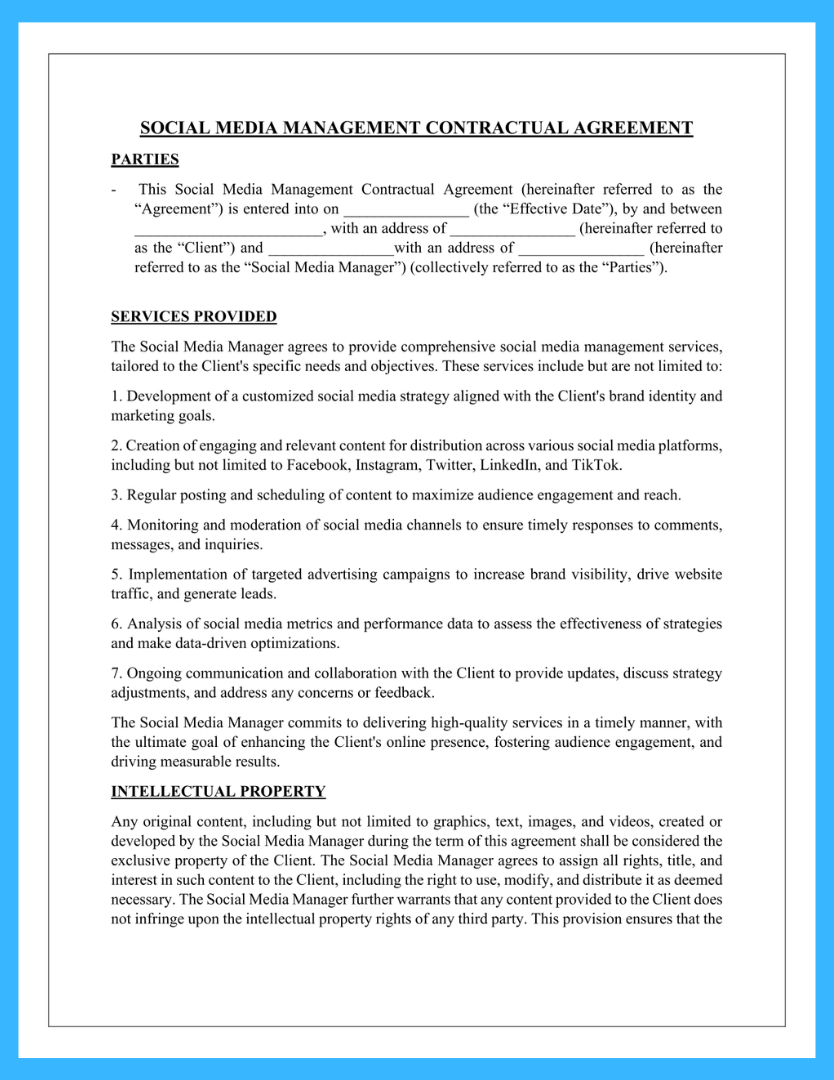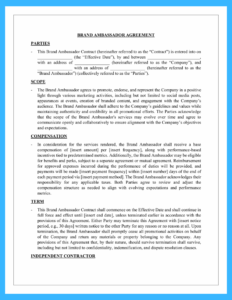Navigating the dynamic world of social media marketing can be incredibly exciting, but also quite complex. As a business, you’re looking for professional help to elevate your brand’s online presence, and as a marketing agency or freelancer, you’re eager to deliver exceptional results. However, without clear boundaries and expectations, even the most promising partnerships can hit a snag. That’s why having a solid agreement in place from the get-go is not just good practice, it’s essential for a smooth and successful collaboration.
Think of it as setting the stage for a blockbuster performance. Everyone knows their lines, their cues, and what’s expected of them. A well-crafted social media marketing contract acts as your script, ensuring both client and service provider are on the same page regarding goals, deliverables, and responsibilities. It’s about protecting your interests, fostering trust, and ensuring that the focus remains firmly on achieving those all-important marketing objectives.

Why You Absolutely Need a Solid Social Media Marketing Contract
Let’s be real, nobody wants misunderstandings or disputes. They drain time, energy, and resources that could be better spent on growing your brand. A robust contract lays out the terms of your engagement in black and white, preventing those "I thought you said…" moments. It acts as a blueprint for the entire project, ensuring clarity for everyone involved, from the client’s marketing manager to the agency’s content creator. This level of professionalism also builds confidence, assuring the client that they are working with an organized and reliable partner.
One of the biggest areas of potential conflict often revolves around the scope of work. What exactly is included in the service? Are we talking about daily posts on three platforms or weekly updates on one? Does it include ad spend management, or is that a separate service? Without a detailed outline, expectations can diverge wildly, leading to disappointment and frustration. A comprehensive contract explicitly defines these boundaries, leaving no room for ambiguity.
Defining Deliverables and Expectations
Clarity on what will be delivered and when is paramount. This section should be meticulous, breaking down every aspect of the service. It’s not just about listing tasks, but detailing the frequency, quantity, and quality of those tasks.
- Which social media platforms are included (e.g., Facebook, Instagram, LinkedIn, X, TikTok, Pinterest, YouTube)?
- What is the frequency of content creation and posting (e.g., 5 posts per week on Instagram, 3 articles shared on LinkedIn)?
- Will the service include engagement monitoring and response management (e.g., replying to comments and messages within 24 hours)?
- How often will performance reports be provided, and what metrics will they cover (e.g., monthly reports on reach, engagement, follower growth)?
- Does the contract include social media advertising campaign setup and management, and if so, what budget is allocated (separate from service fees)?
- Who is responsible for providing source content, such as images, videos, or brand guidelines?
Payment Terms and Schedule
Money matters can be delicate, which is why your contract needs precise details about compensation. This includes the total fee, whether it’s a flat rate, an hourly charge, or a monthly retainer. You’ll also specify the payment schedule, such as an upfront deposit, monthly installments, or payment upon completion of milestones. Don’t forget to include provisions for late payment fees and any expenses that might be reimbursed.
Intellectual Property and Ownership
Who owns the content created? This is a crucial question. Typically, once the client pays for the service, they own the intellectual property rights to the content created specifically for their campaigns. However, the contract should explicitly state this transfer of ownership and address any usage rights the agency might retain for portfolio purposes.
The agreement should also include clauses on confidentiality, ensuring that both parties protect sensitive business information. Furthermore, outlining termination conditions – how either party can end the agreement early and what happens to pending payments or work – provides an exit strategy that minimizes potential fallout. Finally, a dispute resolution mechanism, like mediation, can save a lot of headaches if disagreements arise.
Key Elements to Include in Your Social Media Marketing Contract Template
Now that we understand the importance, let’s look at the practical components you’ll want to ensure are present in your social media marketing contract template. This isn’t just a list of items, but a framework designed to build a strong, transparent working relationship. Getting these details right upfront means you can focus on building a stellar online presence without worrying about administrative loose ends.
Start with the basics: clear identification of both the client and the service provider, including their legal names and contact information. Following this, the "Term of Agreement" defines the duration of the contract. Is it a one-time project, a month-to-month arrangement, or a fixed-term agreement? It should also specify how the contract can be renewed or terminated, as discussed earlier.
The "Scope of Services" section, as highlighted, is critical. This is where you list every single service the social media marketing professional or agency will provide. Be incredibly detailed, painting a clear picture of the deliverables.
- **Content Strategy Development:** Research, audience analysis, tone of voice guidelines.
- **Content Creation:** Writing posts, designing graphics, editing videos (specify quantity and type).
- **Content Scheduling and Publishing:** Using specific tools or manual posting, frequency.
- **Community Management:** Responding to comments, direct messages, and reviews.
- **Performance Tracking and Reporting:** What tools are used, frequency of reports, key metrics.
- **Ad Campaign Management:** If applicable, separate from organic efforts, including ad copy, targeting, and budget oversight.
Beyond the services, clearly delineate what is not included. This might be ad spend, professional photography costs, or specific software subscriptions the client needs to provide. Establishing these boundaries early prevents scope creep and unexpected charges. Then, reiterate the fee structure, payment schedule, and any late payment penalties or discounts for early payment. This part of the contract should also cover any reimbursable expenses, like travel or specific software subscriptions needed for the project.
Finally, include standard legal provisions such as confidentiality agreements, clauses for indemnification (protecting against legal liabilities), and a "governing law" section that specifies which state or country’s laws will govern the contract. An independent contractor clause is also vital, clarifying that the service provider is not an employee of the client, thus avoiding issues with taxes and benefits. These elements combine to create a comprehensive and legally sound foundation for your social media marketing partnership.
Adopting a clear, well-defined agreement is more than just good business sense; it’s a commitment to a successful partnership. It ensures that both parties are aligned, protecting everyone involved and setting the stage for focused, impactful work. This foundation of clarity allows businesses to truly leverage the power of social media without the anxiety of ambiguity, fostering a collaboration built on mutual understanding and shared goals.



